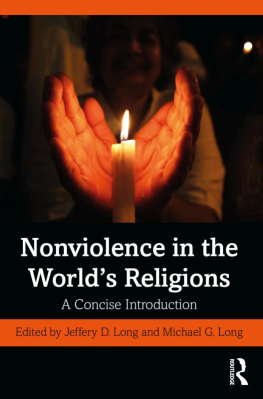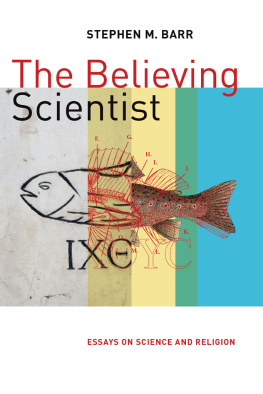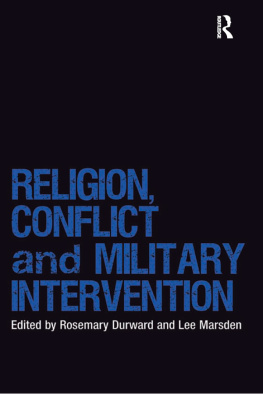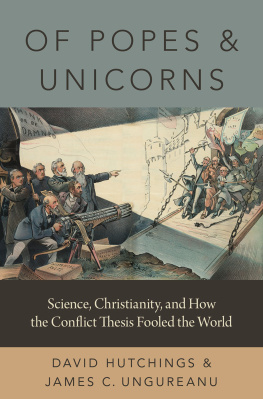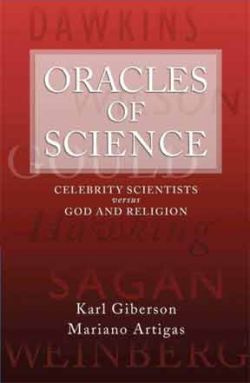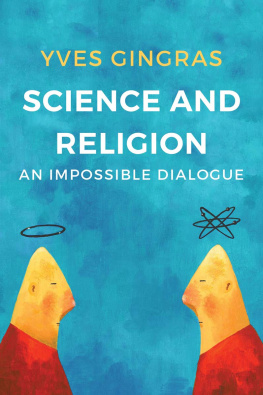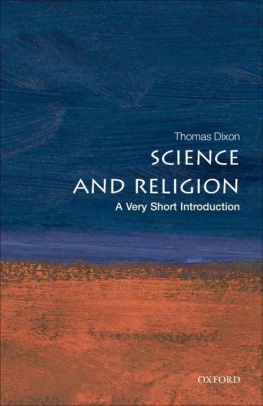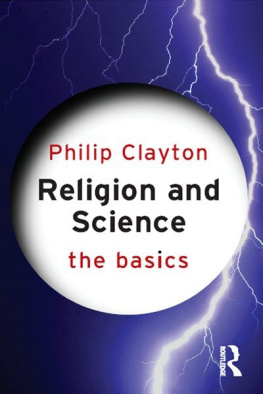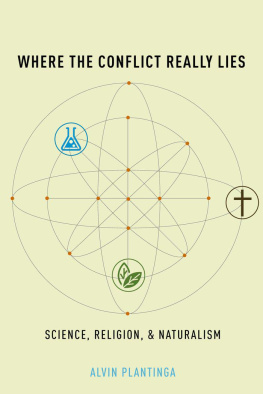Contents
Guide
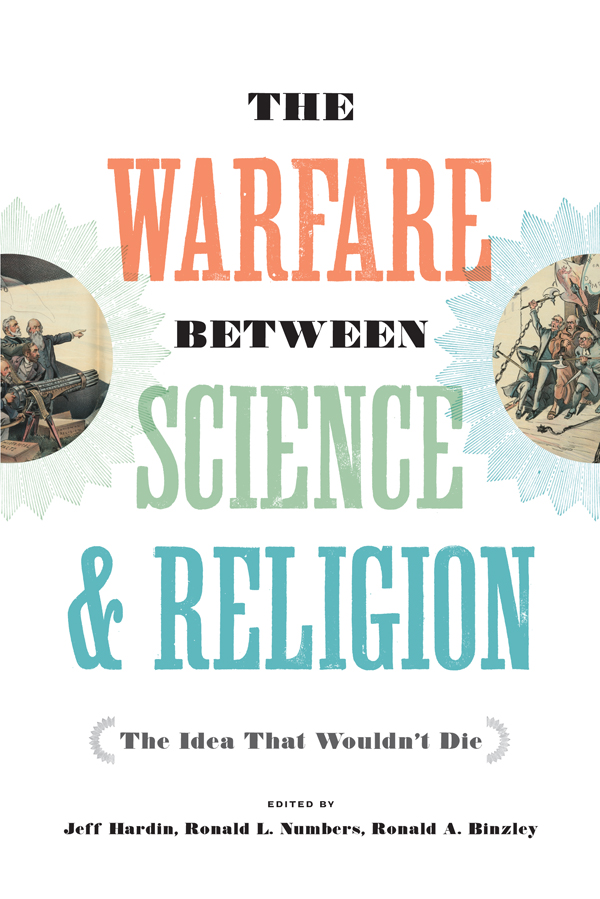
The Warfare between Science and Religion
The Warfare between Science and Religion
The Idea That Wouldnt Die
Edited by
JEFF HARDIN,
RONALD L. NUMBERS,
and RONALD A. BINZLEY
Johns Hopkins University Press
Baltimore
2018 Johns Hopkins University Press
All rights reserved. Published 2018
Printed in the United States of America on acid-free paper
246897531
Johns Hopkins University Press
2715 North Charles Street
Baltimore, Maryland 21218-4363
www.press.jhu.edu
Library of Congress Cataloging-in-Publication Data
Names: Hardin, Jeff, editor.
Title: The warfare between science and religion : the idea that wouldnt die / edited by Jeff Hardin, Ronald L. Numbers, and Ronald A. Binzley.
Description: Baltimore : Johns Hopkins University Press, 2018. | Includes bibliographical references and index.
Identifiers: LCCN 2017054175 | ISBN 9781421426181 (paperback : alk. paper) | ISBN 9781421426198 (electronic) | ISBN 1421426188 (paperback : alk. paper) | ISBN 1421426196 (electronic)
Subjects: LCSH: Religion and science.
Classification: LCC BL240.3 .I34 2018 | DDC 201/.65dc23
LC record available at https://lccn.loc.gov/2017054175
A catalog record for this book is available from the British Library.
Special discounts are available for bulk purchases of this book. For more information, please contact Special Sales at 410 -- 6936 or specialsales@press.jhu.edu.
Johns Hopkins University Press uses environmentally friendly book materials, including recycled text paper that is composed of at least 30 percent post-consumer waste, whenever possible.
CONTENTS
MARK A. NOLL AND DAVID N. LIVINGSTONE
LAWRENCE M. PRINCIPE
MAURICE A. FINOCCHIARO
MONTE HARRELL HAMPTON
BERNARD LIGHTMAN
FREDERICK GREGORY
DAVID MISLIN
EFTHYMIOS NICOLAIDIS
JON H. ROBERTS
BRADLEY J. GUNDLACH
NOAH EFRON
M. ALPER YALINKAYA
RONALD L. NUMBERS AND JEFF HARDIN
PETER HARRISON
JOHN HEDLEY BROOKE
ELAINE HOWARD ECKLUND AND CHRISTOPHER P. SCHEITLE
THOMAS H. AECHTNER
JOHN H. EVANS
ACKNOWLEDGMENTS
This volume would not exist without the generous support of the Issachar Fund, especially its president, Kurt Berends, and its event coordinator, Sara Merrilees, as well as the Department of Zoology (now the Department of Integrative Biology), University of WisconsinMadison. On May 1416, 2015, the Issachar Fund and the Department of Zoology co-sponsored an international three-day conference on the so-called warfare thesisthat is, the belief that an inevitable and irreconcilable conflict exists between science and religion. The gathering brought together more than thirty distinguished scholarsprimarily historians and sociologiststo critique the papers that would eventually become the chapters of this book. In addition to the chapter authors, expert participants included Charles L. Cohen (University of WisconsinMadison), Edward B. Davis (Messiah College), Paul Erickson (Wesleyan University), Joan Fujimura (University of WisconsinMadison), Albert Gunther (University of WisconsinMadison), Salman Hameed (Hampshire College), Jonathan Hill (Calvin College), Nicholas Jacobson (University of WisconsinMadison), G. Blair Nelson (Benedictine University), Scott Prinster (University of WisconsinMadison), Robert J. Richards (University of Chicago), Christopher M. Rios (Baylor University), Michael H. Shank (University of WisconsinMadison), Lawrence Shapiro (University of WisconsinMadison), Elliott Sober (University of WisconsinMadison), John Stenhouse (University of Otago), Rodney L. Stiling (Seattle Pacific University), Marc Swetlitz (Naperville, Illinois), and Stephen P. Weldon (University of Oklahoma). To each of them we are very thankful.
We would also like to thank Jon Roberts for allowing us to borrow the title from his previously published essay The Idea That Wouldnt Die: The Warfare Between Science and Christianity, Historically Speaking 4 (February 2003), 2124; and to express our appreciation to our editors at Johns Hopkins University Press, Jacqueline Wehmueller and Matthew McAdam, who shared our vision for this book and facilitated its publication.
The Warfare between Science and Religion
Introduction
MARK A. NOLL AND DAVID N. LIVINGSTONE
In 1996, Steven Shapin introduced a book inaugurating a new series on the history of science from the University of Chicago Press with a captivating opening sentence: There was no such thing as the Scientific Revolution, and this is a book about it. Based on the careful presentation of evidence in that book, this apparently outlandish statement proved surprisingly persuasive. Although Shapins sentence has already been too often borrowed for too many purposes, one more rip-off seems justified for the persuasive demonstrations of the present volume: There has never been systemic warfare between science and theology, and this is a book that explains why the notion nonetheless lives on.
Like a stubbornly adaptive virus, the idea of inevitable struggle between science and religion is proving hard to eradicate, as Michael Reiss, an evolutionary biologist, discovered to his bitter cost in 2008. On September 16, he was forced to resign his position as education director for the Royal Society over observations he had made about how science teachers should deal with creationism. Reisss critics, who sprang immediately into action, were animated by the presumption of inexorable conflict between science and religion. Notwithstanding all the outstanding work by a generation of historians dismantling the conflict model, their revisionist accounts have scarcely made a dent on leading public intellectuals. In a letter to the president of the Society demanding that Reiss step down, the Nobel Prize winner Sir Richard Roberts of New England Biolabs quipped: We gather Professor Reiss is a clergyman, which in itself is very worrisome. Who on earth thought that he would be an appropriate Director of Education, who could be expected to answer questions about the differences between science and religion in a scientific, reasoned way?
Perhaps one of the reasons why the scholarly subversion of the conflict thesis is passing the public by is that the idea of perpetual warfare between science and religion serves the interests of partisans rather well. It can be deliberately used to excite controversy. As Geoffrey Cantor reminds us, Arthur Keith used it in the 1920s to infuriate the clergy. Comparable taunts in our own day obviously boost sales, make for feisty radio and television, stimulate Internet excitement, and provide colorful courtroom drama. Of course this does not mean that the whole issue can be reduced to just these considerations. But, like all myths, its survival against the historical odds suggests that the conflict fable continues to perform work that quite a few combatants find useful in todays culture.
It certainly means that many share an inclination to find conflict where scant conflict exists. Take the case of the highly distinguished philosopher Jerry Fodor, a self-declared secular humanist. In 2010, he brought out a book with fellow cognitive scientist Massimo Piatelli-Palmarini with the daring title What Darwin Got Wrong . In fact, Fodor had been thinking about Darwinism for several years and had been expressing some doubts about the explanatory power of natural selection in places like the London Review of Books and, rather more technically, in the journal Mind and Language . The details need not detain us. To be clear, Fodor has no problem with evolution and insists that it is a mechanical process through and through. What he wants to say is that natural selection cannot be the mechanism of adaptive evolution that enthusiastic Darwinians claim it is.


